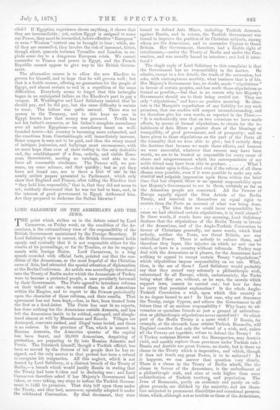LORD SALISBURY ON THE ARMENIANS AND THE JEWS.
THE point which strikes us in the debate raised by Lord Carnarvon, on Friday week, on the condition of the Ar- menians, is the extraordinary view of the responsibility of the British Government maintained by the Foreign Secretary. If Lord Salisbury's view is correct, the British Government holds openly and cynically that it is not responsible either for the results of its proceedings, or for its Treaties, or for its engage- ments with foreign States. Lord Carnarvon, in a long speech crowded• with official facts, pointed out that the con- dition of the Armenians, as the most hopeful' of the Christian races of Asia, had attracted the special attention of diplomatists at the Berlin Conference. An article was accordingly introduced into the Treaty of Berlin under which the Armenians of Turkey were to become a protected people, a. race peculiarly favoured by their Government. The Porte agreed' to introduce reforms on their behalf at once, to extend' them to all Armenians within the Empire, and to report to the Powers' periodically upon the character of those reforms, and their results. That agreement has not been. ltept,—lias, in fact, been treated from the first as a dead-letter. The Porte has sent in no reports, has done nothing for the Armenians outside Armenia, and has left the Armenians inside to be robbed, outraged', and slaugh- tered almost at will by 11fussulmans and' Itoords. Villages are destroyed, convents sacked, and illegal- taxes levied, and there is no redress. In the province of Van., which is nearest to Russian Armenia, the Armenian quarter of the capital has been burnt, and 50,000. Armenians, despairing of protection, are preparing to fly into Russian Armenia and Persia. The Patriarch himself, though a Turkish official, has been so moved by the distress of his Reople that ho has re- signed, and the only answer to that protest has been a refusal to recognise his resignation. All this neglect, which is not denied by Lord Salisbury, is a distinct breach of the Treaty of Berlin,—a breach which would justify Russia in stating that the Treaty had been b:Oken and in declaring war ; and Lord Carnarvon therefore asked if her Majesty's Government had taken, or were taking, any steps to induce the Turkish Govern- ment to fulfil its promises. That duty fell' upon them under the Treaty, and they had, moreover, specially adopted it under the celebrated Convention. By that docunaent, they were
bound to defend Asia Minor, including Turkish Armenia against Russia, and in return, the Turkish Government was bound to improve the position of its Christian subjects, among whom are the Armenians, and to surrender Cyprus to Great Britain. Her Government, therefore, had a double right of interference,—under the Treaty of Berlin and under the Con- vention, and was morally bound to interfere ; and had it inter- fered ?
The single reply of Lord Salisbury to this complaint is that the Government has no responsibility in the matter. He admits, except in a few details, the truth of the accusation, but asks, with contemptuous acerbity, what business that is of his. Her Majesty's Government has, no doubt, made " stipulations " in favour of certain peoples, and has made those stipulations as formal as possible,—but that is no reason why her Majesty's Government should see to their being carried out. They are only " stipulations," and have no positive meaning. So abso- lute is the Marquis's repudiation of any liability for any such promises, that our readers will suspect misunderstanding, and we therefore give his own words, as reported in the Times:- " It is Undoubtedly true that on two occasions we have made efforts, by means of formal stipulations, to obtain for the in- habitants of Asia Minor a greater share of the blessings of tranquillity, of good government, and of prosperity ; and we have given to those stipulations on the part of the Porte all the formality that we were able to give ; but I entirely deny the doctrine that because we made those efforts, and because we were successful, whatever that success may have been worth, we are to be treated as responsible for every cause of abuse and misgovernment which the correspondents of my
noble friend may have been able to produce What I wish to insist upon is this,—that even if the reform of all these abuses were possible, even if it wore possible to make any sub- stantial and palpable impression upon them within the brief time that has elapsed, there is no special responsibility upon her Majesty's Government to see to them, certainly as far as the Armenian people are concerned. All the Powers of Europe equally signed the 61st Article of the Berlin Treaty, and reserved to themselves an equal right to receive from the Porte an account of what was being done.
The idea that we could incur responsibility be- cause we had obtained certain stipulations, is in itself absurd." In these words, if words have any meaning, Lord Salisbury declares that the stipulations of the Berlin Treaty in favour of the Armenians, and of the Anglo-Turkish Convention in favour of Christians generally, are mere words, which bind nobody, neither the Porte, nor Great Britain, nor any individual Power. There is nobody to enforce them, and therefore they lapse, like injuries on which no suit can be raised, or laws in a country without tribunals. Turkey, may deal with the Armenians as it pleases, for the Armenians have nothing to appeal to except certain Treaty "stipulations," which stipulations impose responsibility on no one. What, then, is the use of them ? Lord Salisbury would' probably say that they record very solemnly a philanthropic wish, entertained by all Europe, which, unfortunately, the Turks being what they are, without, as he says, the morals whieh support laws, cannot be carried out; but how far hes he carry that pessimist explanation I' Ts the whole Anglo- Turkish Convention a wish, upon which this country is in no degree bound to act ? In that case, why not denounce the Treaty, resign Cyprus, and relieve the Government to all future time of an anxious responsibility ? Why leave to ad- versaries or quondam friends so just a ground of animadver- sion as philanthropic stipulations never carried out ? Or which part of the Berlin Treaty is a mere wish ? If Russia, for example, at the eleventh hour retains Turkish Roumelia, will England consider that only the refusal of a wish, and, unless all the Powers act together, refuse to defend the Treaty ? Or if Turkey reclaims Bosnia and the Herzegovina, may Austria yield, and meekly replace those provinces under Turkish rule I Russia and Austria are great Powers, no doubt, but is there no clause in the Treaty which is imperative, and which, though it does not touch any great Power, is to bo enforced'? As it happens, we can answer that question very clearly. There is a clause in the Treaty of Berlin which, like the clause in favour of the Armenians, is the embodiment of a philanthropic wish, and aims at ends higher than mere redistribution of Turkish torritom and population. The Jews of Roumania, partly on economic and partly on reli- gious grounds, are disliked by the majority, and are there- fore subjected to permanent disabilities and occasional persecu- tions, which, although not so terrible as those of the Armenians, are still shamefully severe. Consequently, the diplomatists at Berlin arranged that the abolition of religious disabilities should be one of the conditions of Roumanian independence. Roumania, like Turkey, is very unwilling to fulfil these stipulations, and like Turkey, interposes constant delays, talks of constitutional difficulties, and would, if she could, still leave the Jews outside the protection of the law. The Jews appeal to the Powers through their " Alliance," as the Armenians appeal through their Patriarch, and the British Government finds that it is bound to maintain these stipulations. The sufferers are not Christians, they are Jews, a race to which great personages, both in finance and politics, belong, and consequently, till their rights have been acknowledged and their wrongs redressed, Roumania cannot be officially acknowledged, or a British diplo- matic Agent remain in Bucharest. Roumania is not, indeed, invaded, but the most stringent of all forms of diplomatic pres- sure is unhesitatingly applied. There is not one single reason for our conduct to Roumania, which we fully acknowledge has been justifiable conduct, which would not justify us in withdrawing Sir Henry Layard from Constantinople, and leaving the Sultan face to face with his European enemies. Instead of doing that, Lord Salisbury pats the Porte upon the back, acknowledges that it cannot help itself, promises that it shall not be punished, whatever massacres it may tolerate, and so leaves the question,—to write, let us hope, a despatch showing that in the existing circumstances of the British Ministry the Jewish clauses of the Treaty of Berlin must be enforced, though the Christian clauses are only " stipulations," of no account at all as agreements, which it is " absurd " to think involve responsibility. The case of the Armenians is a shameful one, and it is aggravated by the fact that the Government in neglecting them is false to its own theory of its own duties, and plays .directly into the hands of Russia. If the Government has laid down one distinct theory, it is that Russia shall not be strengthened on the Asiatic side, and, nevertheless, it strengthens her. The province which Russia obtained under the Treaty of Berlin needs nothing but population to become a valuable possession, and the Turks, by making life unendur- able in Turkish Armenia, are providing it with a population. Yet we, who promised to prevent that process, and who wish Russia to be weak, and not strong, not only do not pre- vent it, but by publicly admitting that the stipulations are a 'nullity, encourage Turkey to proceed in a course which any Russian Governor of Kars must cordially approve. And to make the absurdity complete, we refuse to protect Armenians scattered through the Turkish Empire, and so force them to look to Russia, which holds half their country, and which is only too ready or eager to secure hundreds of thousands of unpaid agents, the bankers and tradesmen of all cities in Turkey, by declaring herself their friend. Lord Sails- Ibury's speech gives the Russian Government a million of Arme- nian allies in Turkey, men settled everywhere—there are said to be 200,000 of them in Constantinople, though we doubt it—men who hear everything, know everything, and from their position influence alike the Christian and Mahommedan communities. - Granting that it is right to ignore those stipulations in Treaties which only benefit mankind, and not any special British interests, still, if Russia is the enemy, where is the common-sense of thus strengthening Russian hands I Lord Salisbury asks if he is to redress every act of violence on Armenians in Van. Certainly not, nor every act of violence on Jews in Wallachia. But he will succeed in making the Jews of Roumania free men, for all that ; and were he only equally energetic in Constanti- nople, could liberate the Armenians. Let him insist on an Armenian Governor-General for Erzeroum, as he insisted on the .deposition of Ismail Pasha, and the oppression of Armenians will be a thing of the past.



































 Previous page
Previous page